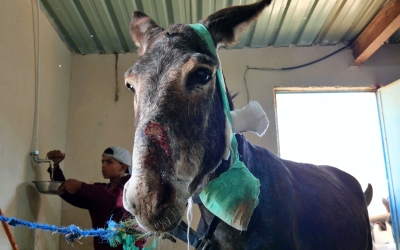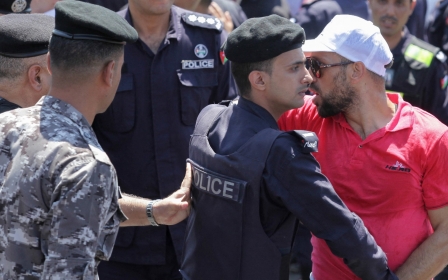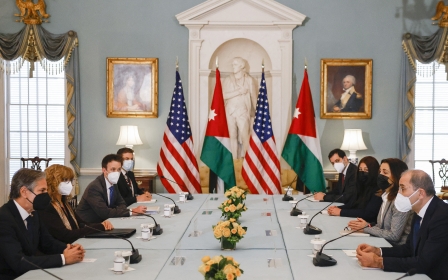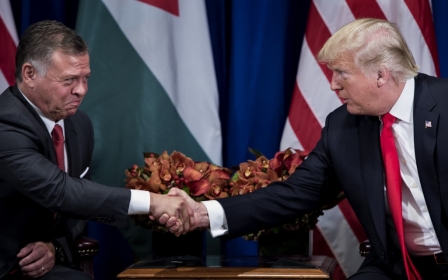Jordan: Police operation in Petra produces harsh criticism of regional authority
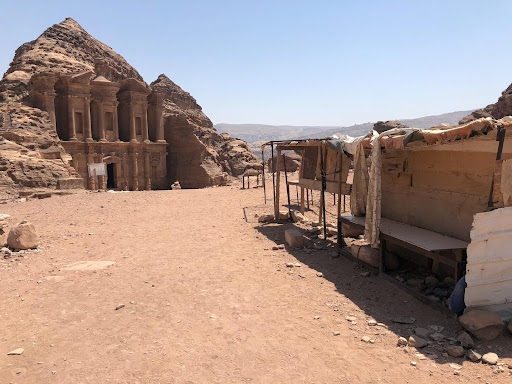
Petra is arguably Jordan's most famous national site.
Located 230km south of Jordan’s capital, Amman, Petra’s ancient Nabataean ruins attract hundreds of thousands of tourists to the Hashemite kingdom each year. International visitor receipts constitute 20 percent of Jordan’s GDP.
Hundreds of souvenir sellers, guides, and renters of rides on donkey and camelback operate in the area, many of whom ply their trade without permits from the Petra Development and Tourism Region Authority (PDTRA).
'We are originally from Petra. Since the days of our grandparents’ grandparents, since the day we were born, we have been in Petra'
- Rukhia Al-Bdoul
This situation has long been a source of simmering tension between the Bdoul tribespeople, who work much of the trade, and the state, which views their activities as illegal.
On 25 August, Jordan’s General Directorate of Gendarmerie sent armoured vehicles equipped with tear gas cannons into Petra Archaeological Park to “remove any non-permitted installations in the region”.
New MEE newsletter: Jerusalem Dispatch
Sign up to get the latest insights and analysis on Israel-Palestine, alongside Turkey Unpacked and other MEE newsletters
The gendarmes’ operation gained national attention after videos on social media showed children from the Bdoul tribe throwing rocks at the armoured vehicles, which launched tear gas in Petra and nearby Umm Sayhoun, the Bdoul’s home village, in response.
In response to the 25 August confrontation, the US Embassy issued a warning against travel to Petra, which has since been deleted.
Speaking to a primetime audience on Nabdh al-Balad - Jordanian broadcaster Roya TV’s nightly talk show - PDTRA Chief Commissioner Suleiman Farajat explained on 28 August that “security forces came in coordination with the PDTRA to bring order to the archaeological park, where illegal economic activities had begun to damage tourism in Jordan in general”.
Farajat positioned the gendarmes’ operation, which injured several Bdoul tribespeople, as the rational outcome of a choice between “pain for an hour versus pain every hour” due to “bad practices that are out of control”.
‘Our life is in Petra’
The PDTRA permits the activities of souvenir sellers and horse owners from the Layathna tribes, whose work in Petra concentrates around the archaeological park’s main entrance, located at the base of the confederation’s hillside hometown of Wadi Musa.
The PDTRA’s chief commissioner is from the Layathna tribe, as are most of the authority’s employees, realities that Bdoul tribespeople use to undergird claims that a double standard exists in the treatment of Wadi Musans versus people from Umm Sayhoun.
Speaking to Middle East Eye on condition of anonymity, a high-ranking PDTRA official stated that bringing order to Petra was necessary because “the archaeological site can’t handle unorganised economic activity within it. It is also illogical for large numbers of people to be at the site instead of at school or inside their homes”.
But for Rukhia Al-Bdoul, a non-permitted souvenir seller who lived in a cave before the national government relocated her tribe from Petra to Umm Sayhoun in 1984, the archaeological site is a second home.
Pointing to an incline across from Petra’s Monastery mountain trail - where 900 rock-hewn steps lead visitors past exposed ridges, a Nabataean necropolis, and several dozen female-owned souvenir stands - Al-Bdoul told MEE: “I was born over there. I was born here, in Petra.”
She continued, “We are originally from Petra. Since the days of our grandparents’ grandparents, since the day we were born, we have been in Petra.”
“Our life is in Petra, and our livelihood comes from Petra.”
One problem, two diagnoses
Developed over their centuries-old presence in Petra, the Bdoul’s close affinity to the archaeological site makes any attempt to reduce their presence in it an inherently sensitive issue.
Nevertheless, a retired Bdoul souvenir seller who wished to remain anonymous told MEE, “The matter of informal economic activity can be resolved. How can it be resolved? As a government official, you need to have credibility in the eyes of the citizens.”
He emphasised, “Everything can be resolved through dialogue. Without dialogue, nothing will be resolved.”
Far from dialogue, an anonymous Bdoul tribesman who owns a refreshment stand in Petra informed Middle East Eye that “when the PDTRA speaks with you, they employ the language of threats: you either do this or I’ll call the gendarmes”.
"The PDTRA wants to try and bring order without compensation. In other words, if you have a business, I don’t care. I’m going to organise you. What happens to your economic interests isn’t important to me," he explained.
The PDTRA official framed the issue differently, however.
“We believe that the people of Umm Sayhoun are unable to articulate the interests of Umm Sayhoun, and that the region’s inhabitants are not of a single opinion,” he said, referring to the Bdoul tribe.
“If an opinion exists, it is unfeasible. Furthermore, there are some people who oppose the idea of change.”
Hidden agenda
Chief Commissioner Farajat supported the PDTRA official’s claims on Roya TV: “Before going for the security solution, we went for the peaceful solution: we provided a portion of the [entry] ticket fee, we provided electric vehicles, and we employed 200-250 persons in workshops at a time in which, as you’re aware, the general unemployment rate in Jordan is as high as it is.”
“We provided all of these things, yet there was zero receptiveness.”
Confronted with this assertion, the refreshment stand owner conceded that Farajat had established an association for the donkey owners.
“The people were happy that there was an association, that he wanted to organise them. Everything was great. He introduced the electric vehicles [to reduce the donkeys in Petra] and there was progress: that much was clear," he said.
“But in the end, the people discovered that there were conditions linked to the association, conditions that were against their interests: women cannot work in Petra, people cannot live in the caves, areas for working animals… must be removed.”
According to Abdelrahman Al-Bdoul, who introduced himself as a non-permitted “local guide”, allocating a portion of Petra’s 50-dinar entry fee to the Bdoul also comes with strings.
“The dinar per ticket is in exchange for work,” he said, adding that “there is no distribution” at the end of the month.
The retired souvenir seller explained that the dinar funds the association, which in turn funds the workshops that Farajat lauded: “The workshops are a sham. They said, ‘we want to give you a dinar for each ticket sold’, but how is the dinar disbursed? It is provided to the workshops.”
“The PDTRA can say, ‘we want 50 people to work on renovating the back trail to the Monastery, and you, the association, will pay them.’ How does the association pay? With the dinar.”
He concluded, “the monthly wage for the workshops… is 270 dinars. The lowest electricity bill is 70 dinars. Water costs 30. If you have a baby, you’ll spend 50 dinars per month on four bottles of formula. Add in miscellaneous bills and you reach 270.”
In contrast, people working in Petra “make 500, 600, or 700 dinars per month”. The choice between working “illegally” or abiding by the association is an easy one, as far as livelihoods are concerned.
‘We support order’
Aside from providing less income than what can be gained from working in Petra, the association, established in October 2021 under the name Darb Al-Anbat, is unique in its use of entry fee transfers to pay wages for manual labour, such as renovating infrastructure in the archaeological park.
Founded by tourism entrepreneurs from Wadi Musa in the 1980s, the Association of Horse Owners receives eight dinars from each entry ticket purchased and distributes these revenues among its 353 registered members.
The same occurs in the case of the Bdoul’s 30-person Association of Camel Owners, which receives 35 cents per ticket.
'We would take a portion of the entry fee, and in exchange, we would organise ourselves. Everyone would be organised, and nobody would break the law'
- Souvenir seller
For Abdelrahman Al-Bdoul, the non-permitted local guide, it would be easy to bring order to Petra.
“We support order. The situation needs order. Right now, if the PDTRA gave us five dinars per ticket, I would be the first person to refrain from going to Petra. I wouldn’t go. Working in Petra isn’t easy.”
A female, non-permitted souvenir seller, who goes by the name Khudr,a made a similar point.
After revealing to MEE that women were not allowed to register for Darb Al-Anbat, she proposed, “The young men from our tribe should benefit from the entry fee and receive five dinars per ticket sold. In addition, we would like for the PDTRA to create an association for women.
“We would take a portion of the entry fee, and in exchange, we would organise ourselves. Everyone would be organised and nobody would break the law.”
Gesturing at her store and the sandstone cliffs surrounding it, she emphasised: “These are people’s livelihoods. You think they’ll leave for free? If your grandparents’ grandparents lived on this land, and this was your shop and your homeland, would you abandon it in exchange for nothing?”
Middle East Eye delivers independent and unrivalled coverage and analysis of the Middle East, North Africa and beyond. To learn more about republishing this content and the associated fees, please fill out this form. More about MEE can be found here.


